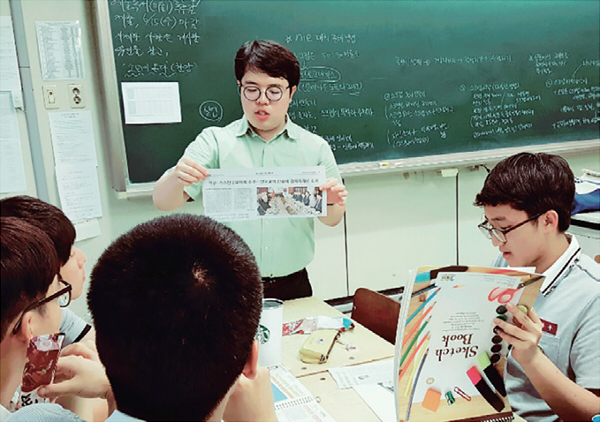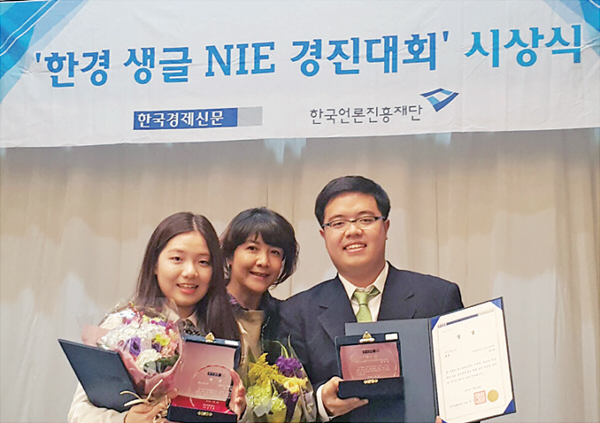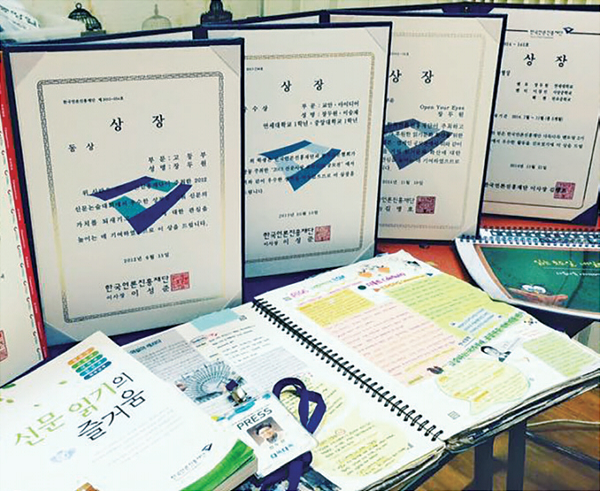
The Crisis of Newspapers! Some people claim newsprint will no longer be needed and replaced by Internet news because the old print method doesn’t attract today’s digital generation. However, one university student objects to this opinion strongly. Although he is a young man of the digital age, he fell in love with newsprint, saying, “Newspapers have changed my life.” He is not only a newspaper journalist but also the youngest NIE(Newspaper In Education) lecturer to date. He won first prize in a newspaper clipping contest earlier this year. In order to gain insight into the charms of newsprint, The Sookmyung Times met up with Chang Doowon.
It’s been said that you are heavily involved with news being a NCS reporter, NIE lecturer, and so on. What made you decide to get that immersed in the press industry?
I began to read the newspaper daily from the time I was 10 years old. That said, I have been reading newspapers now for over 10 years. I still remember the moment I said to my mother, one day I will have my article printed and my name read by others in a newspaper, when I was 10. One day, my mother presented me with my baby book. In it, she would often record how I used to enjoy reading and writing. I suppose it was from early on that my life was determined. I knew news reporting was for me. I am grateful for the chance to have worked at ‘The Korea Economic Daily’ as intern from 2014 to 2016. While a majority of the public views a journalist’s role as merely conducting interviews and writing articles, my internship taught me there was so much more. I learnt that journalists also function as mentors and lecturers, so I began to study NIE (Newspaper In Education).
You just mentioned that a journalist is also a mentor and lecturer. That’s an interesting perspective. Would you elaborate on that? And, would you also explain NIE for our readers who are unfamiliar with it?
NIE is short for ‘Newspaper In Education’, and it focuses on the development of language skills. In other words, it is education that utilizes the news by incorporating materials such as newspaper clippings and newspaper creation. It started in the U.S, but was quickly adopted by Japan and Finland. In Korea, the public was first introduced to this form of education by Chosun-ilbo in 1990, and since that time, it spread rapidly within a 5-year period. Some universities in Korea have also jumped on board. As I mentioned before, I believe journalists are teachers, using newsprint and teaching via the concept of NIE. I researched NIE on my own and after receiving NIE certification, I began taking advantage of newspapers to teach children.
Would you please detail how you would lecture using newsprint, and what particular topics do you use in the classroom?
I have met various students from high schoolers to children press corps members. I try to focus on how to read an article correctly and effectively, preparation for a NIE contest, have students gather newspaper clippings for discussion, write personal newspaper clippings, and connect NIE with the family. After class, I ask students to voice opinions on NIE and newsprint. More often than not, students have said that the class was interesting. In other words, this is a fresh way of learning. After ending my 4-month NIE course at a high school, the students continued with their learning by establishing an after school newspaper club and contacted me to request feedback and advice as outside mentor. Some of those students have since graduated high school and are now at university. I am glad that the study of newspapers had a profounding effect on them. It was a meaningful experience for me.

As intern at ‘The Korea Economic Daily’, you were awarded top prize for exemplary intern of 2016. What type of work did you do and learn there?
Mostly I was responsible for administrative work, managing the Test of Economic Sense And Thinking (TESAT), but I also wrote articles on the economy, taught NIE classes, gathered newspaper clippings, and honed my writing skills. I also guided children when they visited on a field trip to the company to learn about the press. I think the biggest reason I took top prize was that I never sought material benefit. I wanted to discover myself and grow. The experience taught me 3 things: how to adapt to a specific organizational structure, mind-control, and ways to advance my ability. It took me an entire internship year to realize those things. If I may, I recommend after your sojourn as intern, people ask your supervisor for feedback on your work. It is a great way of seeing your strengths and weaknesses objectively.
Having had a number of opportunities to write articles, what would you say is the most important thing to keep in mind when writing a news story?
Besides the content, basic mechanics are essential. I always review my spelling, grammar, and word spacing. If those things are cared for, readers tend to have more trust in the reporter. If there are too many of those basic errors, readers may lose faith in the reporter. Also, I pay close attention to the correct spelling of a journalist’s name and e-mail address so that readers are able to correctly contact the person for more information or to make a comment. Ensuring content quality of a story is also important in terms of editing. Whenever I make sure of statistical data, I go to great lengths to ensure data reliability. Additionally, reporters must always make an effort not to plagiarize any part of their article. To avoid accidently using others’ words, journalists must read and reread their work repeatedly.

Some claim newsprint will eventually disappear from existence because of the trend to go online, so why are you so keen on newsprint and news clippings?
I concede to the idea of going online, but I object to the notion that newsprint will disappear. Because my generation is still connected to paper, newsprint will survive. In fact, newspapers offer the public more than Internet news. The stories published on internet news often lose their value because they are too often obstructed by advertisements. These adverts interrupt readability. However, newspapers separate their placement of adverts from an article so that readers may become immersed into the story. Personally, I love the smell of printed material. Another advantage of newsprint is that the public is able to clip similar articles from different journalists, gather them together in one place, and make informed decisions or analysis the issue fairly. Because news clippings last the centuries and are recordings of past events, it can be great treasure in my life.
You have also just recently won the NIE contest along with your sister for newspaper clippings. Would you please tell us what it is important to consider when clipping news stories?
Thank you for bring that up. It was a proud moment for both my family and to my younger sister, who is just a high school student. To prepare for the contest, my sister and I had to go througha lengthy and involved discussion on which topic we could focus our attention on. Interestingly, although we both wanted to center on the same issue, our opinion on the issue differed. We voiced our ideas and took notes. When we were unsure of something, we discussed it thoroughly, especially wordings and concepts presented in the articles. To readers who are interested in newspaper clipping, I recommend two things: be creative and be categorical. Be silly, be inventive, try all sorts of methods such as drawing, using infographics and so on. Making writing visual is a great method of clipping. However, be categorical by making your own standards. For instance, if you opt to organize your clippings on the progression of time, do not change in the middle. If you decided to write chronologically, do so, don’t change.
It is inspiring to learn of your definite mindset and beliefs towards the press. However, this path in life must not have been an easy one to choose. What challenges have you faced and how did you overcome them?
Frankly speaking, I often gave up the small luxuries of student life while at university like dating and travelling. My friends would often tease me, saying that I had fallen in love with a newspaper. I frequently feared my choice in life because there is an increasingly strong distrust among people of a newspaper’s value. Some people also spoke ill of my career path because they felt newspaper clippings would never amount to anything. I fought back by entering in as many contests as I could find in order to keep faith in my belief and boost my confidence. However, to me the most important thing is not how others see me, but how I see myself. We must never give up on our dreams and belief in ourselves to reach the results we desire. I tried to encourage myself with “Never give up” “Be positive” and “Just do it.”

Each of your challenges must have reaped rewards and happy moments. Would you please share some of them with our readers?
I love my family. Knowing that I’ve meaningfully altered my sister’s life, I feel a sense of pride. My sister is now considering a career in press, following in my footsteps. As an unexpected bonus, I have been able to introduce my mother’s letter for publication in the newspaper. It gives me great pride to know that others are reading my mother’s words. While some may believe filial duty involves giving money to one’s parents or making them proud by social or position success, I am confident this has pleased my mother more. Also, donating my talent by giving NIE classes for young students is extremely rewarding. All of these events in my life have only confirmed and reinforced my dream.
You are indeed a passionate person. Do you any other short-term goals you wish to achieve?
Like most others, I have plenty of dreams, but the first is to become a journalist who can transend the generations. I want to allow all voices to be heard fairly and faithfully, so when I retire from my job fifty years later, I want to be remembered by the public as a good and fair reporter.Also, I will continue to endorse the strengths of NIE in school curriculums. In order to achieve this last dream, I will regularly lecture students and create educational content that is based on the news. Recently, I have created a scrapbook to record all the various people whom I have met over the years. I will also continue to gather newspaper clippings continuously and it is my hope that one day I can exhibit my collection in a gallery or museum. In short, my hope is to become a person that inspires others.

Thank you for your time today. Would you please leave a final word to Sookmyungians dreaming of one day becoming a journalist like you?
Thank you for coming to interview me. I had a lovely time, and I hope that my story energizes a great many Sookmyungians. First of all, be passionate! Before getting all worried about your choice in life, start! A real leader doesn’t live their life passively. The owner of your life is you, so live it actively. You have the potential to change reality, life, and the world. Remember this: “Readers are leaders.” If you don’t read, you won’t develop. Though you may only have a few minutes each day, read, and read as much as you can. I hope Sookmyungians read from various media and from books, and become moral leaders of the world. Ripen your thinking!
Chang Doowon
• Student of Korean Language and Literature at Yonsei University
• Received an Top Prize as an Exemplary Intern at ‘The Korea Economic Daily’
• Received First Prize in the ‘The Newspaper Clippings’ Contest
• Received an Top Prize of 'the Minister of Education and Prime Minister'
• The Youngest 30th Chosun Ilbo NIE Instructor
• Received Prize of 'Great Reporter' in Dadocdadoc NIE


